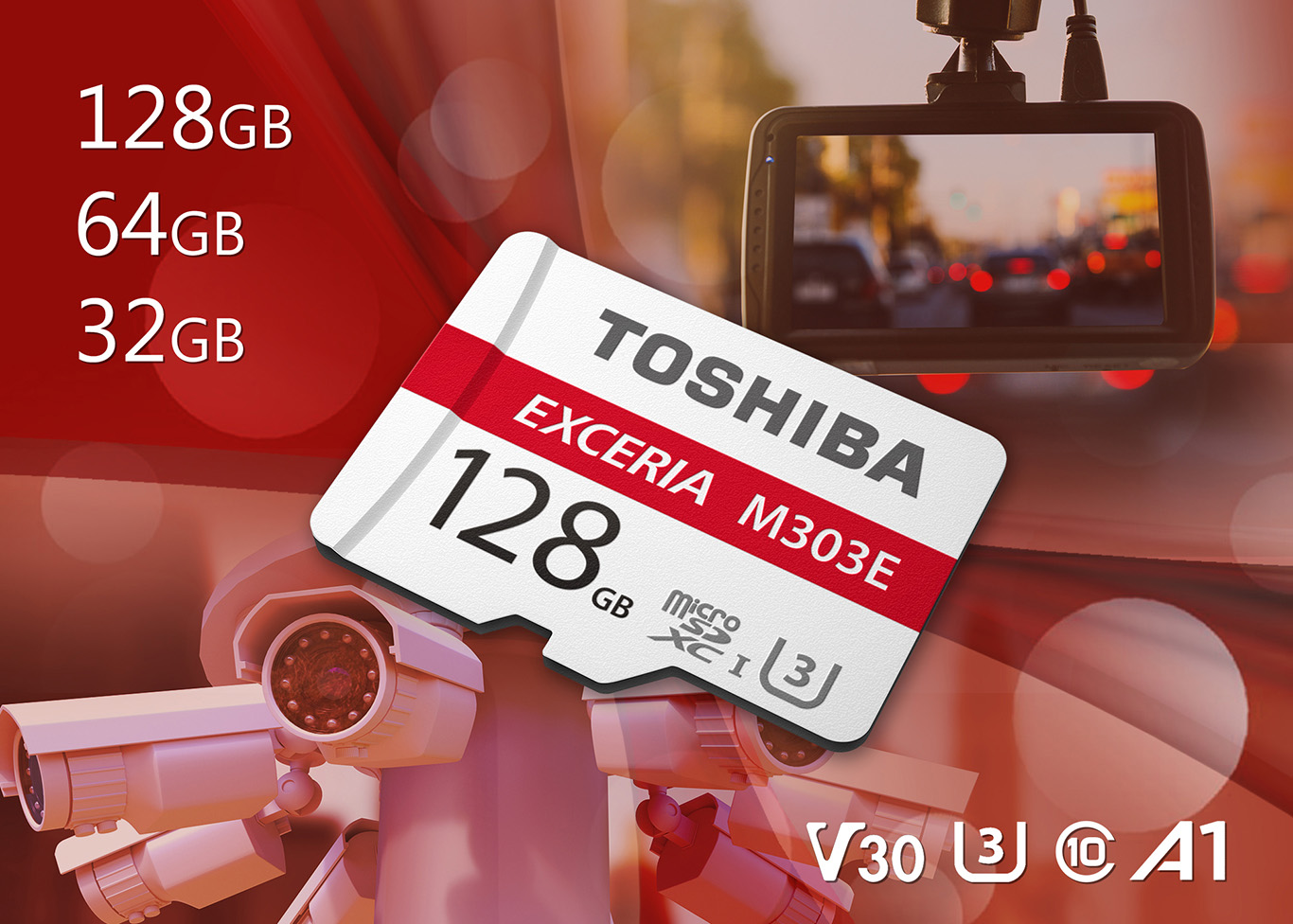Please select your location and preferred language where available.
Toshiba Memory launches EXCERIA M303E range of endurance microSDs for full HD dashboard and surveillance cameras[1]
Mobile World Congress 2019, Barcelona – hall 2, booth 2A3EX: Toshiba Memory Europe launches EXCERIA M303E range of endurance microSDs for full HD dashboard cameras and surveillance cameras[1] – 128GB model designed for recording demands of dashboard cameras; lasts for 6,000 hours[2] of recording
- Düsseldorf, Germany, 25 February 2019

Toshiba Memory Europe GmbH has announced its new EXCERIA M303E range of endurance microSD memory cards, designed for use in dashboard cameras and surveillance cameras.
The new range has 128, 64 and 32 GB options[3], the 128GB model can record approximately 12 hours[4][5] of Full HD video. These have been designed to record for up to 6,000 hours[2] for 128GB model of looped[5] recording (3,000 hours[2] for 64 and 32 GB models of looped[5] recording) and come with a 2 year warranty[6].
Regular SD memory cards are unsuitable for use with dashboard cameras and surveillance cameras. Some of regular SD memory cards would not warrant continuous recording uses such as for dashboard cameras.
The M303E range of endurance microSD memory cards uses BiCS FLASH technology and undergoes Toshiba Memory Corporation's stringent quality control process to provide the endurance required by general users, making it a good choice whether for commuting or driving.
All M303E are able to write at up to 65 MB/s and read at up to 98 MB/s[7] and are ranked as A1 under the SD Association's Application Performance Class. They use the UHS-I SD interface and deliver UHS Speed Class 3, Video Speed Class 30, and SD Speed Class 10[8].
M303E is waterproof to IPX7[9], X-ray proof to ISO7816-1[10], shock resistant[11], resistant to electrostatic discharge (ESD) from the human body[12], incorporates over-current protection[13], and has a 110oC operating temperature range (-25oC and +85oC)[14] to meet the in-car environmental stresses.
The first shipment to our distributors will start in the second quarter of 2019.
For further information about the EXCERIA M303E microSD memory card, please visit: https://www.toshiba-memory.com/product-category/micro-sd-cards/
Notes:
[1] M303E is not designed for business or industrial uses. Toshiba Memory Corporation does not warrant any compatibility of M303E with any devices.
[2] Designed target for accumulated time based on Full HD (1920×1080) video content recorded at 21Mbps. Results may vary depending on the device and other conditions. SD memory cards are consumables and have a finite product life as represented by the number of write cycles and other parameters. We recommend replacing your microSD memory card within two years, assuming that it is used for eight hours per day (or four hours for the 64 and 32 GB versions).
[3] Capacity is based on installed flash memory and some parts of the capacity is reserved for management functions that user cannot use as available memory. 1 GB is calculated as 1,073,741,824 bytes. The 128 GB card has an approximate usable capacity of 115.2 GB, the 64 GB card has approximately 57.6 GB, and the 32 GB card has approximately 28.8 GB.
[4] The 128 GB card can store approximately 12 h 20 m of Full HD, and approximately 15 h 20 m of HD. The 64 GB card can hold approximately 6 h 10 m of full HD and 7 h 40 m of HD video. The 32 GB card can hold approximately 3 h of full HD, and 3 h 50 m of HD video. Approximate recording time calculated based on a data rate of 21 Mbps for full HD recording and a data rate of 17Mbps for HD recording. Results may vary depending on device and other conditions. 1Mbps = 1,000,000bps.
[5] When the card becomes full, the oldest data is automatically overwritten to make space for new recordings.
[6] Toshiba Memory Corporation's warranty policy: https: //global.toshiba-memory.com/warranty.html.
[7] 1 MB/s is calculated as 1,000,000 bytes/s. These values are the best values obtained in specific test environment at Toshiba Memory Corporation and Toshiba Memory Corporation neither warrant read nor write speed use in individual devices.
[8] Speed classes indicate the results under the test conditions specified by the SD Association.
[9] According to the IPX7 standard, the product can function after it is submerged and left for 30 minutes in static tap water at room temperature (15°C to 35°C) and at a depth of 1m.
[10] According to the ISO7816-1 standard, the product can function, after contaminating this product on 0.1 Gy of X-ray.
[11] The product (microSD memory card only) can function, after carrying out the gravity fall of this microSD memory card from 5m in height. Based on Toshiba Memory Corporation's test results.
[12] ESD test environment stipulated by IEC61000-4-2: 150 pF energy storage capacitor, 330 Ω discharge resistor, ±15-kV air discharge.
[13] Electrical fuse is mounted. When the over current occurs inside a card, electrical fuse will be cut in order to prevent over heat and ignition.
[14] Based on Toshiba Memory Corporation's test results. The operation in all the situations is not warranted.
The information (pricing/spec, conditions of the service and contact information, etc.) listed in this release is valid as of the date of the release. Changes might occur without prior notice.
Company names, product names, and service names may be trademarks of their respective companies.